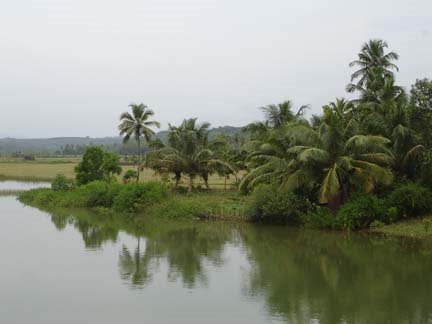Ancient villages names are wonderful fossils of our cultural heritage. This
is especially significant in a region like Tulunadu that is deprived of any
kind of documented early history older than Alupa period. One of the strange
evidence we gather suggests that the Tulu language and culture in Tulunadu grew
over an older substrata consisting of Pakrit, Munda, Toda, Koraga etc.
The village in Mangalore Taluk located proximal to the Mangalore Refinary
and Petrochemicals Limited, is called Kuthettur.
Similar sounding village names with kuth as a prefix like Kuthar (a place near Konaje, Mangalore University) and Kuthpadi (or
Kuthpady) is suburb of Udupi town. Similarly, Kuthyar is also a place South of shirva and Udupi. There is a Kuthlur Village is in Belthanagdi Taluk and
a Kuthkunja,
in Sullia Taluk. You
can also find village/hamlet names like
Kuthaje, Kuthila, Kudmar(Kuthmar), etc.
Now, what does the word kuth stands for? The present Tulu language does not have a word
like kuth or kuttu in its general vocabulary, even though it may usually mean a
hurdle or problem in Kannada language.
Kuth , Kutta
Kuth, kuthe, kuthi = kutta (Prakrit/Hindi);
dog, first domesticated animal, mans best friend; It is not just a
Prakrit/Hindi or Marati word. Analogous word with same meaning can be found in the
European Hunagarian/Magyar languages. In Hungarian language, kutya, means a dog: and
it also means bad; miserable etc possibly implying the general plight of dogs. The
word Kuth is considerd to have been derived from the Sumerian language where it
(kuth) also means a dog. Thus the word ‘kutha’ for dog is quite ancient word
that has been adopted subsequently by several languages world wide during the
course of evolution and migration of people.
Interestingly, village names with the prefix of ‘kuth’ – ancient villages
dedicated to the mans’ best friend, the dog- can be found spread in different
parts of India.
2. There is an analogous word ‘kutha’
or ‘kutta’ in Tulu language (refer:
Tulu Nighantu) which means steep or erect. Some readers may like to apply this
connotation to place names with prefix of ‘kuth’ like
Kuthethur, Kuthar, kuthaje, Kuthpadi etc.
However, if you study geography of these places you do not find any
unusually steep mountains in these villages. On the contrary, many of the steep
hills in Tuunadu sucha s Kodanjikal or other hillas have nat been named as
Kuth- villages.
3. The prefix kuth in these place names could not be a Tulu word because such places
(with prefix kuth) are found all over India, where the words of Tulu language are not known or understood.
Kuth~
Villages in India
Andhra Pradesh: Kuthempur, Kuthnepalle, Kuthampauttu.Kuthangi.
Assam: Kuthari, Kuthari Bagisha, Kuthori, Kuthepi, Kuthurijar.
Bihar: Kuthuriahat, Kuthwa,
Chattisgarh: Kuthar, Kuthur, Kuthrel, Kuthraud,
Himachal Pradesh: Kuthah, Kuthal, Kuthan, Kuthar,
Kuthara, Kuther, Kuthera, Kuthari, Kuthwari, Kuthandal,
Kuthehar,Kuthman, Kutharna, Kuth sarotriyan, Kuthog, Kuthanhad, Kutharli,
Kuthaira ,Kuthiana,Kuthulag, Kutharbeet, Kuthakar,
Karnataka: Kuthar, Kuthali, Kuthethur, Kuthyar, Kuthpady, Kuthagodu, Kuthanhalli,
Kuthlur, Kutharahalli, Kuthaganahalli, Kuthlur, Kuthandahalli, Kuthappanahlli, Kuthagatta,
Kuthingere, Kutharabavi, Kuthagondanahlli, Kuthagale,
Kerala: Kuthannur, Kuthianthode.
Madhya Pradesh: Kuthonda, Kuthili, Kuthila,
Kuthilagawan, Kuthuliya, Kuthali, Kuthar, Kuthia, Kuthuli,
Maharastra: Kuthegaon, Kuthare, , Kuthulipada, ,
Nagaland: Kuthur
Orissa: Kutharpali, Kuthulipada, Kuthulimunda, Kuthurla,
Punjab: Kutha keri,
Rajastan: Kuthania, Kuthara,
Tamilandu: Kuthumbakam, Kuthanur, Kuthampoondi,Kutham palyam,Kuthiluppai,
Kuthathupatti, Kuthur,Kuthimeikipatti,Kuthapanjan,Kuthiramoli.
Uttar Pradesh: Kuthawati, Kuthia, Kuthaliya, Kuthilahar, Kuttara, Kuthounda, Kuthli,
Uttar Khand: Kuthar, Kuthnaur, Kuthha, Kuthur, Kuthalgaon, Kuthar, Kuthera,
West Bengal: Kuthibari, Kuthegerya, Kuthisakdal, Kuthipara etc.
Major linguistic alteration
Villages dedicated to dogs, the mans’ best friend, are not uncommon in
Tulunadu. Later Villages/hamlets like Nayampalli, Nayabasadi, etc are known.
However, the word kuth appears to be associated with ancient places named before
the advent of Tulu language in these areas.
The words, like kuth used in these place names, are no longer continue to be used
in Karavali/Tulunadu regions in the sense originally intended. This implies and
reflects a major episode of linguistic and socio-cultural changes during the early
history of Karavali/Tulunadu.
The presence of ancient village names
with prefix kuth in coastal terrain
of Karavali suggests that the Tulunadu was also under the influential spell of languages
(like Prakrit and Munda) that pervaded India during the early history probably
before the advent and propagation of Tulu in these parts.
In other words, in a major paradigm
shift, in the Karavali, during a specific episode in the ancient history, the
dominant language of communication was changed gradually from the older
Prakrit/Munda base to the current Tulu/Dravida matrix, along with advent of new phase
of immigrants.. The newly imposed language happened to borrow some of the words, beliefs, customs and
cultural strings from the older substratum language and culture. In the process, many of the older words and customs were forgotten and obliterated from
the active sphere of life and communication of the people.
[



No comments:
Post a Comment